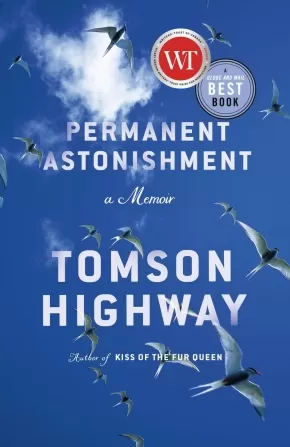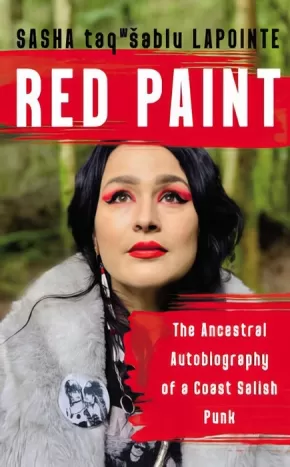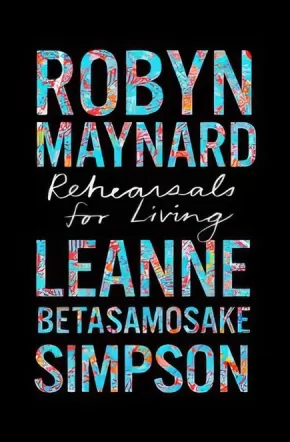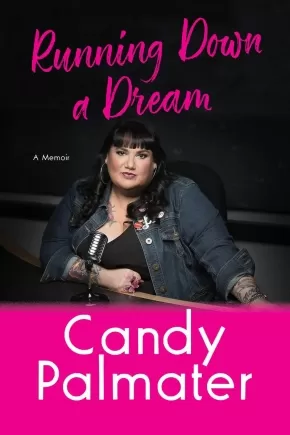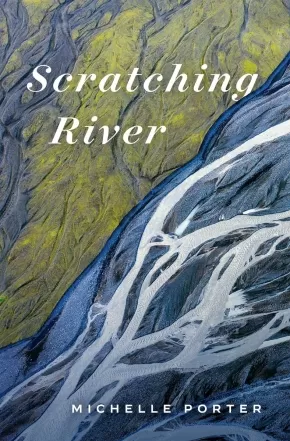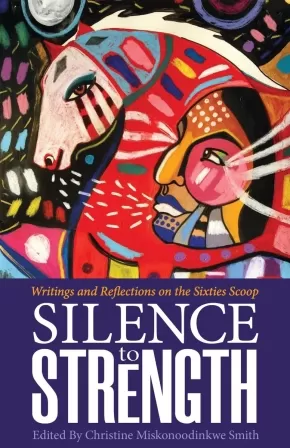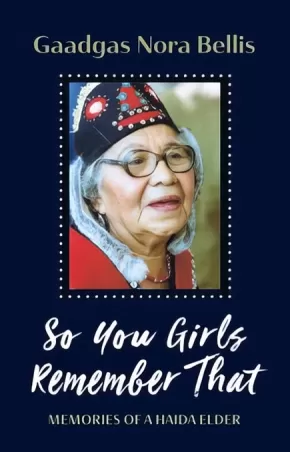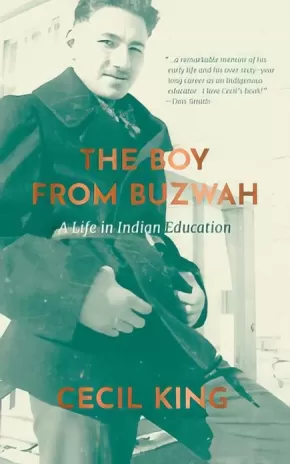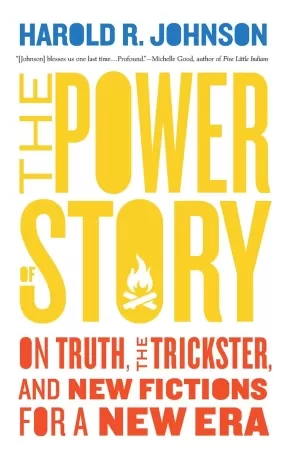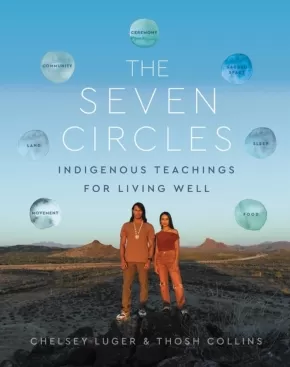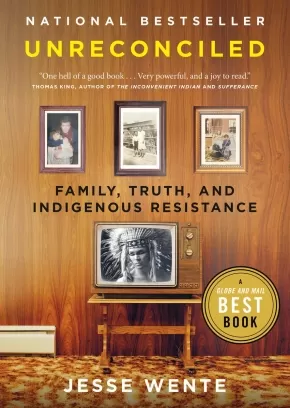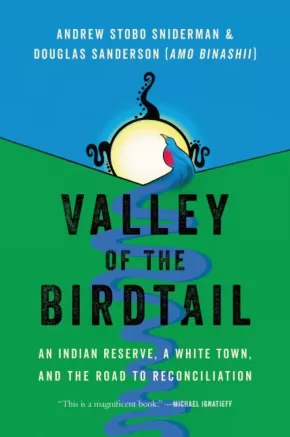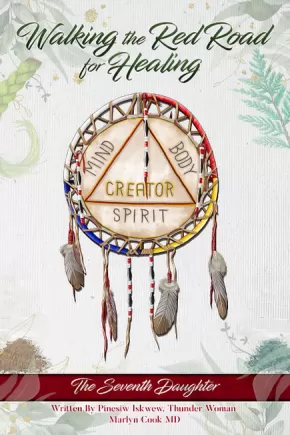
Biographies
121
-
135
of
303 Results;
Sort By
Go To
of 21
Permanent Astonishment: A Memoir (PB)
$22.00
Format:
Paperback
Text Content Territories:
Indigenous Canadian; First Nations; Cree (Nehiyawak);
Reading Level: N/A
ISBN / Barcode: 9780385696227
Synopsis:
Synopsis:
Capricious, big-hearted, joyful: an epic memoir from one of Canada’s most acclaimed Indigenous writers and performers.
Tomson Highway was born in a snowbank on an island in the sub-Arctic, the eleventh of twelve children in a nomadic, caribou-hunting Cree family. Growing up in a land of ten thousand lakes and islands, Tomson relished being pulled by dogsled beneath a night sky alive with stars, sucking the juices from roasted muskrat tails, and singing country music songs with his impossibly beautiful older sister and her teenaged friends. Surrounded by the love of his family and the vast, mesmerizing landscape they called home, his was in many ways an idyllic far-north childhood. But five of Tomson's siblings died in childhood, and Balazee and Joe Highway, who loved their surviving children profoundly, wanted their two youngest sons, Tomson and Rene, to enjoy opportunities as big as the world. And so when Tomson was six, he was flown south by float plane to attend a residential school. A year later Rene joined him to begin the rest of their education. In 1990 Rene Highway, a world-renowned dancer, died of an AIDS-related illness.
Permanent Astonishment: Growing Up in the Land of Snow and Sky is Tomson's extravagant embrace of his younger brother's final words: "Don't mourn me, be joyful." His memoir offers insights, both hilarious and profound, into the Cree experience of culture, conquest, and survival.
Additional Information
352 pages | 5.15" x 7.97" | Paperback
Red Paint: The Ancestral Autobiography of a Coast Salish Punk (HC) (1 in Stock)
$33.00
Format:
Hardcover
Text Content Territories:
Indigenous American; Native American; Salish; Coast Salish; Nooksack; Upper Skagit;
Grade Levels: 12; University/College;
ISBN / Barcode: 9781640094147
Synopsis:
Synopsis:
An Indigenous artist blends the aesthetics of punk rock with the traditional spiritual practices of the women in her lineage in this bold, contemporary journey to reclaim her heritage and unleash her power and voice while searching for a permanent home.
Sasha taqʷšəblu LaPointe has always longed for a sense of home. When she was a child, her family moved around frequently, often staying in barely habitable church attics and trailers, dangerous places for young Sasha.
With little more to guide her than a passion for the thriving punk scene of the Pacific Northwest and a desire to live up to the responsibility of being the namesake of her beloved great-grandmother—a linguist who helped preserve her Indigenous language of Lushootseed—Sasha throws herself headlong into the world, determined to build a better future for herself and her people.
Set against a backdrop of the breathtaking beauty of Coast Salish ancestral land and imbued with the universal spirit of punk, Red Paint is ultimately a story of the ways we learn to find our true selves while fighting for our right to claim a place of our own.
Examining what it means to be vulnerable in love and in art, Sasha offers up an unblinking reckoning with personal traumas amplified by the collective historical traumas of colonialism and genocide that continue to haunt native peoples. Red Paint is an intersectional autobiography of lineage, resilience, and, above all, the ability to heal.
Awards
- Winner of the 2023 Pacific Northwest Book Award
Reviews
"Red Paint is a miraculous book. Sasha LaPointe walks us through the sites of her evisceration while rebuilding a home within her body using sturdy materials: rose quartz, cedar bark, red clay, and the words of her ancestors. With each potent sentence, she shows us what access to power looks like. She shows us how to become whole.” —Elissa Washuta, author of White Magic
"As luminous as the morning sun over the fir forests, Red Paint is a story of where strength takes us. Sasha taqwšəblu LaPointe goes looking to the past to help heal from terrible traumas, finding inspiration in her ancestors, the Salish people. This is a book destined to be a classic. Read it." —Rene Denfeld, bestselling author of The Child Finder
Additional Information
240 pages | 5.31" x 8.29" | Hardcover
Rehearsals for Living (HC) (1 in Stock)
$32.00
Format:
Hardcover
Text Content Territories:
Indigenous Canadian; First Nations; Anishinaabeg; Mississauga; Alderville First Nation;
Reading Level: N/A
ISBN / Barcode: 9781039000650
Synopsis:
Synopsis:
A revolutionary collaboration about the world we're living in now, between two of our most important contemporary thinkers, writers and activists.
When the world entered pandemic lockdown in spring 2020, Robyn Maynard, influential author of Policing Black Lives, and Leanne Betasamosake Simpson, renowned artist, musician, and author of Noopiming: The Cure for White Ladies, began writing each other letters—a gesture sparked by a desire for kinship and connection in a world shattering under the intersecting crises of pandemic, police killings, and climate catastrophe. These letters soon grew into a powerful exchange about where we go from here.
Rehearsals for Living is a captivating and visionary work—part debate, part dialogue, part lively and detailed familial correspondence between two razor-sharp writers. By articulating to each other Black and Indigenous perspectives on our unprecedented here and now, and reiterating the long-disavowed histories of slavery and colonization that have brought us to this moment, Maynard and Simpson create something new: an urgent demand for a different way forward, and a poetic call to dream up other ways of ordering earthly life.
Reviews
“This book must be read for its future vocabularies, its political intimacies, its careful assemblage of the materials of our activisms, and its generous and fulsome thinking.”—Dionne Brand, poet, novelist, and essayist
“Using the age-old practice of letter writing and the land itself as a palimpsest, Robyn Maynard and Leanne Betasamosake Simpson find common ground to challenge the moral legitimacy of the settler nation state, and reinscribe new ways of what it means to be beings who are human in the forensic landscapes of Canada. In Rehearsals for Living, two women, one Indigenous, the other Black and African-descended confront their shared yet different experiences of colonialism, provide new and subversive meanings to the colonial trope of being landed, the mechanism by which the land was (un)settled. Unflinchingly, and in long-overdue and profoundly-needed “reasonings” that reverberate with shared breath, Simpson and Maynard weave their ideas, thoughts and reflections and their deep caring for community and society through the network of issues that impact us today—the pandemic and the differentials in treatment for Black and Indigenous people, the role of BLM, abolition, the necessity of Nibi and homespace for the Nishnaabeg, the joys of living on the land, and parenting in the face of ecological and racial disasters are but a few of the challenges they grapple with. Rehearsals for Living is fundamental to understanding the interlocking, founding crimes of the Americas; necessary for remembering the many erased histories of the on-going struggle for justice, and altogether indispensable to those wanting to create possible solutions.”—M. NourbeSe Philip, author of Zong!
Additional Information
336 pages | 5.46" x 8.32" | Hardcover
Running Down a Dream: A Memoir
$32.99
Format:
Hardcover
Text Content Territories:
Indigenous Canadian; First Nations; Mi'kmaq;
Reading Level: N/A
ISBN / Barcode: 9781443455091
Synopsis:
Synopsis:
A powerful, often funny, always inspiring memoir from a beloved comedian, professional orator, actor, entertainer, gone all too soon.
Candy Palmater loved to connect with people. She lived for the stage, her effervescent presence on television and radio ignited and inspired audiences, touching them with her warm, often spicy humour as well as her positive message about love and kindness. And she always believed that it is never too late to pursue our dreams and that we should never allow others to negatively influence our life’s desires.
Candy described herself as a queer Mi’kmaw lawyer-turned-comic raised by bikers in rural New Brunswick and on the surface, she met with enormous success – on leaving government and the practice of law, she started a career as a stand-up comedian, which led to starring in five successful seasons of her own national TV show, hosting many radio shows and co-guest hosting CTV’s The Social, and landing a recurring role on a hot new sitcom in her fifties. But she is the first to tell you she made all kinds of mistakes and experienced all kinds of failure along the way. Running Down a Dream is Candy’s story, in her own words, of the highs, the lows, the moments of doubt, the turning points when she listened to her gut and tuned out all the people saying no. It’s also a tribute to her family and the love that always bolstered her, despite their own hard times. She shares her stories to inspire us to embrace our failures and to believe in ourselves. And most importantly, Running Down a Dream is a call to love ourselves for who we are.
The world lost Candy in late 2021, and yet she left us with this gift -- a memoir and a message that will inspire us for years to come.
Additional Information
304 pages | 6.00" x 9.00" | Hardcover
Scratching River
$24.99
Format:
Paperback
Text Content Territories:
Indigenous Canadian; Métis;
Reading Level: N/A
ISBN / Barcode: 9781771125444
Synopsis:
Synopsis:
Scratching River braids the voices of mother, brother, sister, ancestor, and river to create a story about environmental, personal, and collective healing.
This memoir revolves around a search for home for the author’s older brother, who is both autistic and schizophrenic, and an unexpected emotional journey that led to acceptance, understanding and, ultimately, reconciliation. Michelle Porter brings together the oral history of a Métis ancestor, studies of river morphology, and news clippings about abuse her older brother endured at a rural Alberta group home to tell a tale about love, survival, and hope. This book is a voice in your ear, urging you to explore your own braided histories and relationships.
Reviews
"Michelle Porter’s Scratching River is a stunning and ruminative poetic work of creative non-fiction that moves across time, geography, Métis history, and kinship. Porter honours her Métis family and ancestors through past, present, and future poetics. The interwoven narratives wrap around Porter’s mother, Porter’s own story as a daughter and sister, and her relationship with her older brother, who was diagnosed as schizophrenic and autistic, and abused in a rural Alberta group home. Scratching River illustrates the powerful journey of reconciliation, as Porter’s family reconnects amongst their ongoing movement, and relocation to find their way back to the river they share." — "Shannon Webb-Campbell, author of Lunar Tides and I Am a Body of Land"
Additional Information
184 pages | 5.25" x 8.00" | Paperback
Seven Aunts
$30.99
Format:
Paperback
Text Content Territories:
Indigenous American; Native American; Anishinaabeg;
Reading Level: N/A
ISBN / Barcode: 9781517912857
Synopsis:
Synopsis:
Part memoir, part cultural history, these memories of seven aunts holding home and family together tell a crucial, often overlooked story of women of the twentieth century.
They were German and English, Anishinaabe and French, born in the north woods and Midwestern farm country. They moved again and again, and they fought for each other when men turned mean, when money ran out, when babies—and there were so many—added more trouble but even more love. These are the aunties: Faye, who lived in California, and Lila, who lived just down the street; Doreen, who took on the bullies taunting her “mixed-blood” brothers and sisters; Gloria, who raised six children (no thanks to all of her “stupid husbands”); Betty, who left a marriage of indenture to a misogynistic southerner to find love and acceptance with a Norwegian logger; and Carol and Diane, who broke the warped molds of their own upbringing.
From the fabric of these women’s lives, Staci Lola Drouillard stitches a colorful quilt, its brightly patterned pieces as different as her aunties, yet alike in their warmth and spirit and resilience, their persistence in speaking for their generation. Seven Aunts is an inspired patchwork of memoir and reminiscence, poetry, testimony, love letters, and family lore.
In this multifaceted, unconventional portrait, Drouillard summons ways of life largely lost to history, even as the possibilities created by these women live on. Unfolding against a personal view of the settler invasion of the Midwest by men who farmed and logged, fished and hunted and mined, it reveals the true heart and soul of that history: the lives of the women who held together family, home, and community—women who defied expectations and overwhelming odds to make a place in the world for the next generation.
Reviews
"Seven Aunts is a celebration of the women in Staci Lola Drouillard’s family who struggled to escape a daunting legacy with unsung courage, humor, and unbreakable love for family. Far more than a family history, Seven Aunts is an honor song that reveals the everyday heroism of these women’s lives."—Diane Wilson, author of The Seed Keeper
"Seven Aunts gives us a unique and privileged insight to the intimate lives and history of a blended Indigenous and immigrant family in northern Minnesota. Staci Lola Drouillard has written with honesty and truth about ‘the treacherous beauty of life’ in a family rich in characters, in love and loss, all with great humor. Anaïs Nin wrote that reaching deep into the personal becomes universal. Seven Aunts is exactly that. It speaks to us of the universal love of family, the reality of historic social challenges, and the strength of the unbreakable bonds of knowing."—Hazel Belvo
Additional Information
320 pages | 5.50" x 8.50" | 7 b&w illustrations | Paperback
Silence to Strength: Writings and Reflections on the 60s Scoop
$18.00
Editors:
Format:
Paperback
Text Content Territories:
Indigenous Canadian;
Grade Levels: 12; University/College;
ISBN / Barcode: 9781928120339
Synopsis:
Synopsis:
From the 1960s through the 1980s the Canadian Children's Aid Society engaged in a large-scale program of removing First Nations children from their families and communities and adopting them out to non-Indigenous families. This systemic abduction of untold thousands of children came to be known as the Sixties Scoop. The lasting disruption from the loss of family and culture is only now starting to be spoken of publicly, as are stories of strength and survivance.
In Silence to Strength: Writings and Reflections on the 60s Scoop, editor Christine Miskonoodinkwe Smith gathers together contributions from twenty Sixties Scoop survivors from across the territories of Canada. This anthology includes poems, stories and personal essays from contributors such as Alice McKay, D.B. McLeod, David Montgomery, Doreen Parenteau, Tylor Pennock, Terry Swan, Lisa Wilder, and many more. Courageous writings and reflections that prove there is strength in telling a story, and power in ending the silence of the past.
Reviews
"This is an excellent collection and I recommend it to all who are interested in learning the truth about Indigenous Peoples by reading what they have written, not what has been written about them by non-Indigenous writers. The striking cover art is by George Littlechild, also a survivor of the Sixties Scoop." - MariJo Moore
Additional Information
140 pages | 5.50" x 8.50" | Paperback
So You Girls Remember That: Memories of a Haida Elder
$22.95
Format:
Paperback
Text Content Territories:
Indigenous Canadian; First Nations; Haida;
Grade Levels: 12; University/College;
ISBN / Barcode: 9781550179774
Synopsis:
Synopsis:
Collected wisdoms, reflections and stories from Indigenous Elder Naanii Nora of the Haida Nation.
So You Girls Remember That is an oral history of a Haida Elder, Naanii Nora, who lived from 1902 to 1997. A collaborative effort, this project was initiated and guided by Charlie Bellis and Maureen McNamara and was years in the making. The resulting book, compiled by Jenny Nelson, is a window into Nora’s life and her family—from the young girl singing all day in the canoe, bossing her brothers around or crossing Hecate Strait on her dad’s schooner, to the young woman making her way in the new white settlers’ town up the inlet, with music always a refrain—these are stories of childhood; of people and place, seasons and change; life stages and transitions such as moving and marriage; and Haida songs and meanings.
This book also contains the larger story of Nora’s times, a representation of changing political relationships between Canada and the Haida people and a personal part of the Haida tale.
What ultimately shines through is Nora’s singular and dynamic voice speaking with the wisdom of years. For example, on giving advice she says: “I like to give anybody advice because when you’re young you don’t know nothing on this world. What’s coming; what’s going … You have to remember it’s a steep hill; you’re right on the top. You slide down anytime if you don’t be careful.”
This is a work of great generosity, expressing Nora’s spirit of living—her joy, humour, spirituality and resourcefulness; her love of children, music and social life; her kindness, strong will and creativity; and her spirit that has nurtured a community and endures to this day.
Royalties will be donated to the Carl Hart Legacy Trust through the Haida Gwaii Community Foundation, to support the Rediscovery Camp at T'aalan Stl'ang.
Reviews
"You can tell if someone has ever met Naanii Nora Brown Bellis Yahgulanaas as the mere mention of her name will make them smile." –Michael Nicoll Yahgulanaas, author of Carpe Fin: A Haida Manga
"Reading my Nanny’s stories in So You Girls Remember That, filled me with emotions. It brought me back to Nanny’s strong warm hugs and her cheeky demeanor, memories of her cluttered house and all the time spent with her. As a Haida, and a father, I worry about the rapidly advancing world, where we are now and where we’re heading. Nanny has laid the blueprint for tackling such worries. Her words remind us to always believe in ourselves, and that love of family and community are essential, not only for survival but also for the flourishing of love, laughter and music." –Tyler Hugh Charlie Bellis, played the melodica in grades 6 and 7 at Tahayghen elementary school
Additional Information
240 pages | 5.50" x 8.50" | Paperback
Standing in a River of Time
$19.95
Format:
Paperback
Text Content Territories:
Indigenous Canadian; Métis;
ISBN / Barcode: 9781772013795
Synopsis:
Synopsis:
Standing in a River of Time merges poetry and lyrical memoir on a journey exposing the intergenerational effects of colonization on a Métis family. Kirton does not shy away from hard realities, meeting them head on, but always treating them with respect and the love stemming from a lifetime of spiritual healing and decades of sobriety. This collection unravels painful memories and a mixed-blood woman’s journey towards wholeness. The Ancestors whisper to Kirton throughout, asking her to heal, to bring them home, so that within these stories of redemption and loss the dead walk with us, their presence felt as the story unfurls in unexpected ways. Kirton does not offer false hope, nor does she push us towards answers we are not yet ready for. Instead, she gestures towards the many healing modalities she has explored as she discovers that the path to reconciliation is not only a long and winding road, but also that it begins with those closest to us.
Additional Information
192 pages | 6.00" x 9.00" | Paperback
The Boy from Buzwah: A Life in Indian Education
$29.95
Format:
Paperback
Text Content Territories:
Indigenous Canadian; First Nations; Anishinaabeg; Odawa (Ottawa);
Reading Level: N/A
ISBN / Barcode: 9780889778504
Synopsis:
Synopsis:
Cecil King’s remarkable memoir, from humble beginnings on a reservation to his unparalleled legacy to ensure Indian Control of Indian Education in Canada.
“Through my eyes, my community was creative, innovative and self-sufficient. In this remote northern traditional First Nation society, the skills, knowledge and abilities that the community needed to survive were all there. . . . The stories are not just of survival and hardship but of the power of the human spirit and the sheer natural genius of individuals.” — Cecil King
Cecil King grew up in the small settlement of Buzwah, Ontario, situated on Wikwemikong Unceded Indian Reserve on Manitoulin Island. This moving memoir shares King’s life on reserve in the 1930s and ’40s and describes a vibrant community full of interesting characters who shared knowledge, warmth, affection, and humour. King also describes his experiences attending Buzwah Indian Day School and St. Charles Garnier Residential School.
After furthering his education, King returned home to Buzwah as a teacher. He quickly became disillusioned with the Ontario curriculum and how inadequately it resonated with on-reserve youth and the realities of Indigenous life. It was then that King began his unparalleled legacy to ensure Indian Control of Indian Education in Canada.
King helped create curriculum that connected to traditional Indigenous cultures and established First Nation language courses in elementary and secondary schools. Over the course of his fifty-year career in education, he would found the Indian Teacher Education Program at the University of Saskatchewan, become the first director of the Aboriginal Teacher Education Program at Queen’s University, and develop Ojibwe language courses across North America.
A remarkable story about a remarkable man, The Boy from Buzwah is a powerful testament to Dr. Cecil King’s work and legacy.
Reviews
“A poignant reflective must-read memoir of an Indigenous educator whose life lived was Indigenizing and decolonizing western academies.” —Marie Battiste, author of Decolonizing Education and Honorary Officer of the Order of Canada
“Miigwetch Cecil King, for sharing your remarkable journey and life in this essential book, which educators and learners will treasure. This is a book of extraordinary generosity and humility, and one that provides both context and direction for the future of Indigenous education.” —Jesse Wente, author of Unreconciled
“An essential account of an Indigenous scholar’s trailblazing and sweeping contributions towards restoring and inspiring indigenous control of indigenous education.” —Verna St. Denis, University of Saskatchewan
“Cecil King’s memoir is an important contribution to the Indigenous literature, documenting early life on the Wikwemikong Unceded Indian Reserve, disclosing the enduring roots of Odawa tradition, chronicling the re-emergence of Anishnawbe culture and the rise of Indigenous activism, particularly in the important area of Indigenous education.” —Hon. Leonard S. Tony Mandamin IPC, Justice in Residence, Faculty of Law/Faculty of Native Studies, University of Alberta
“Cecil King has written a remarkable memoir of his early life and his over sixty-year-long career as an Indigenous educator. The teacher, respected community leader, and post-secondary professor and administrator, argues most convincingly for a system of First Nations education that incorporates fully Indigenous history, culture, and present-day realities. I love Cecil’s book!” —Don Smith, Professor Emeritus of History, University of Calgary
"Cecil King's book about his experiences in a day school, residential school, the bureaucracy and institutional development on Indigenous education presents an important perspective in the debate on educational change in the past half-century. His personal perspective and his use of Ojibwe as part of this history introduces a new qualitative dimension to this debate." —Keith Goulet, former Minister of Northern Affairs for Saskatchewan
Educator Information
King was one of the first to create curricula designed for Indigenous children and education programs to train Indigenous teachers and to establish some of the first Indigenous language courses in North America.
King understood that strengthening students’ cultural identity was key to their academic success and saw how the Canadian curriculum was not designed to do this.
Additional Information
356 pages | 5.00" x 8.50" | Paperback
The Power of Story: On Truth, the Trickster, and New Fictions for a New Era
$22.95
Format:
Paperback
Text Content Territories:
Indigenous Canadian; First Nations; Cree (Nehiyawak); Woodland Cree; Rocky Cree; Montreal Lake Cree;
Grade Levels: 12; University/College;
ISBN / Barcode: 9781771964876
Synopsis:
Synopsis:
Award-winning Indigenous author Harold R. Johnson discusses the promise and potential of storytelling.
Approached by an ecumenical society representing many faiths, from Judeo-Christians to fellow members of First Nations, Harold R. Johnson agreed to host a group who wanted to hear him speak about the power of storytelling. This book is the outcome of that gathering. In The Power of Story, Johnson explains the role of storytelling in every aspect of human life, from personal identity to history and the social contracts that structure our societies, and illustrates how we can direct its potential to re-create and reform not only our own lives, but the life we share. Companionable, clear-eyed, and, above all, optimistic, Johnson’s message is both a dire warning and a direct invitation to each of us to imagine and create, together, the world we want to live in.
Reviews
"Recently in conversation with a friend I remarked that the whole world is a story. Harold Johnson fills that phrase with profound meaning in The Power of Story as he takes ancient figures and modernizes their storied wit and role in creating the worlds we perceive and the boundaries we need. Harold blessed us one last time with a profound conversation on the role of story in every aspect of our lives."—Michelle Good, author of Five Little Indians
“The Power of Story begins where all great stories begin: around a fire. Harold Johnson gives us a seat at the fire to listen and take into ourselves some spellbinding, bracing, and provocative stories told with a view to healing and transforming. As Harold writes ‘It’s starting to get darker now, and a bright fire will help.’ The Power of Story is that bright fire. And it will help. His final book is a balm for our times.”—Shelagh Rogers
Additional Information
192 pages | 5.00" x 8.00" | Paperback
The Seven Circles: Indigenous Teachings for Living Well
$36.99
Format:
Hardcover
Text Content Territories:
Indigenous American; Native American; Sioux; Pima (Akimel O'odham); Osage; Haudenosaunee (Iroquois); Seneca; Cayuga; Anishinaabeg; Ojibwe (Chippewa); Turtle Mountain Anishinaabe;
Grade Levels: 12; University/College;
ISBN / Barcode: 9780063119208
Synopsis:
Synopsis:
In this revolutionary self-help guide, two beloved Native American wellness activists offer wisdom for achieving spiritual, physical, and emotional wellbeing rooted in Indigenous ancestral knowledge.
When wellness teachers and husband-wife duo Chelsey Luger and Thosh Collins founded their Indigenous wellness initiative, Well for Culture, they extended an invitation to all to honor their whole self through Native wellness philosophies and practices. In reclaiming this ancient wisdom for health and wellbeing—drawing from traditions spanning multiple tribes—they developed the Seven Circles, a holistic model for modern living rooted in timeless teachings from their ancestors. Luger and Collins have introduced this universally adaptable template for living well to Ivy league universities and corporations like Nike, Adidas, and Google, and now make it available to everyone in this wise guide.
The Seven Circles model comprises interconnected circles that keep all aspects of our lives in balance, functioning in harmony with one another. They are:
- Food
- Movement
- Sleep
- Ceremony
- Sacred Space
- Land
- Community
In The Seven Circles, Luger and Collins share intimate stories from their life journeys growing up in tribal communities, from the Indigenous tradition of staying active and spiritually centered through running and dance, to the universal Indigenous emphasis on a light-filled, minimalist home to create sacred space. Along the way, Luger and Collins invite readers to both adapt these teachings to their lives as well as do so without appropriating and erasing the original context, representing a critical new ethos for the wellness space. Each chapter closes with practical advice on how to engage with the teachings, as well as wisdom for keeping that particular circle in harmony with the others.
With warmth and generosity—and 75 atmospheric photographs by Collins throughout—The Seven Circles teaches us how to connect with nature, with our community, and with ourselves, and to integrate ancient Indigenous philosophies of health and wellbeing into our own lives to find healing and balance.
Reviews
“A life-changing holistic guide to wellness rooted in empowerment, resiliency, and ‘good medicine.’ This book is for any human being searching for wellness solutions in a chaotic world, a true antidote to colonization.” — Vina Brown, Indigenous Scholar, Entrepreneur, Artist, and Professor of Indigenous Studies at Northwest Indian College
“The Seven Circles is a true innovation in Indigenous thought; it brings our shared heritage and traditional teachings to life. Truly inspiring. Readers will find their journey to be a motivating guide for self-transformation.” — Taiaiake Alfred, Mohawk Philosopher
“While the term ‘wellness’ has been co-opted and diluted by (primarily white) social media influencers in recent years, Luger and Collins are recentering the conversation around how to use Indigenous cultural values, foods, and modalities of movement as tools for spiritual, mental, physical, and emotional healing.” — Vanity Fair
“[Two of the] faces in the health and wellness scene that are pushing for inclusivity, justice, and kindness, toppling old conventions to make their own…Luger and Collins rewrite modern narratives regarding Native health while addressing complex histories and ongoing disparities.” — Outside magazine
“Spellbinding. This may be the first book I’ve ever read that made me stop and decide, “I’m making this change now!” Seven Circles opened my eyes to a way of life that is tested by time, guided by nature, and urgently needed today." — Christopher McDougall, author of Born to Run, Natural Born Heroes, and Running with Sherman
“Wisdom abounds in this stimulating offering.” — Publishers Weekly
“Luger and Collins provide a range of sensible, informed, accessible guidance for both small- and large-scale lifestyle changes. An appealing manual for healing the self through Indigenous traditions.” — Kirkus Reviews
Additional Information
256 pages | 7.00" x 9.00" | 75 Colour Photos | Hardcover
Unreconciled: Family, Truth, and Indigenous Resistance (PB)
$22.00
Format:
Paperback
Text Content Territories:
Indigenous Canadian; First Nations; Anishinaabeg; Ojibway; Serpent River First Nation;
Reading Level: N/A
ISBN / Barcode: 9780735235755
Synopsis:
Synopsis:
A prominent Indigenous voice uncovers the lies and myths that affect relations between white and Indigenous peoples and the power of narrative to emphasize truth over comfort.
Part memoir and part manifesto, Unreconciled is a stirring call to arms to put truth over the flawed concept of reconciliation and to build a new, respectful relationship between the nation of Canada and Indigenous peoples.
Jesse Wente remembers the exact moment he realized that he was a certain kind of Indian--a stereotypical cartoon Indian. He was playing softball as a child when the opposing team began to war-whoop when he was at bat. It was just one of many incidents that formed Wente's understanding of what it means to be a modern Indigenous person in a society still overwhelmingly colonial in its attitudes and institutions.
As the child of an American father and an Anishinaabe mother, Wente grew up in Toronto with frequent visits to the reserve where his maternal relations lived. By exploring his family's history, including his grandmother's experience in residential school, and citing his own frequent incidents of racial profiling by police who'd stop him on the streets, Wente unpacks the discrepancies between his personal identity and how non-Indigenous people view him.
Wente analyzes and gives voice to the differences between Hollywood portrayals of Indigenous peoples and lived culture. Through the lens of art, pop culture, and personal stories, and with disarming humour, he links his love of baseball and movies to such issues as cultural appropriation, Indigenous representation and identity, and Indigenous narrative sovereignty. Indeed, he argues that storytelling in all its forms is one of Indigenous peoples' best weapons in the fight to reclaim their rightful place.
Wente explores and exposes the lies that Canada tells itself, unravels "the two founding nations" myth, and insists that the notion of "reconciliation" is not a realistic path forward. Peace between First Nations and the state of Canada can't be recovered through reconciliation--because no such relationship ever existed.
Reviews
"Unreconciled is one hell of a good book. Jesse Wente’s narrative moves effortlessly from the personal to the historical to the contemporary. Very powerful, and a joy to read."—Thomas King, author of The Inconvenient Indian and Sufferance
“With Unreconciled, Jesse Wente proves himself to be one of the most influential Anishinaabe thinkers of our time. By telling his own story, Jesse provides Canada with an essential roadmap of how to move forward through the myth of reconciliation towards the possibility of a just country. There is much work to be done but reading Jesse’s words, soaking them in and letting them settle in your mind, will set us all on the right path.”—Tanya Talaga, bestselling author of Seven Fallen Feathers
“Mahsi cho, Jesse Wente, for illuminating the biggest issue facing Canada’s relationship with Indigenous people: Canada fears Indigenous people because Canada is terrified of our power. Each language class, culture camp, graduation ceremony, each Supreme Court Ruling, each Treaty (that wasn't forged), each feast and naming ceremony… is part of the incredible Reclaiming happening right now. Please read this book. It's an infuriating read but a necessary one.”—Richard Van Camp, author of The Lesser Blessed and Moccasin Square Gardens
"With Unreconciled, Jesse Wente proves he's a storyteller through and through—one who is unafraid of telling hard but necessary truths, yes, but also one who knows that vulnerability is the quickest way to the heart. Wente shares so generously with his readers in this book, braiding together his own past with the problems of the present, ultimately offering us a way forward, together."—Alicia Elliott, author of A Mind Spread Out on the Ground
Additional Information
208 pages | 5.10" x 7.98" | Paperback
Valley of the Birdtail: An Indian Reserve, a White Town, and the Road to Reconciliation
$36.99
Format:
Hardcover
Text Content Territories:
Indigenous Canadian; First Nations;
ISBN / Barcode: 9781443466301
Synopsis:
Synopsis:
A heart-rending true story about racism and reconciliation.
Divided by a beautiful valley and 150 years of racism, the town of Rossburn and the Waywayseecappo Indian reserve have been neighbours nearly as long as Canada has been a country. Their story reflects much of what has gone wrong in relations between Indigenous Peoples and non-Indigenous Canadians. It also offers, in the end, an uncommon measure of hope.
Valley of the Birdtail is about how two communities became separate and unequal—and what it means for the rest of us. In Rossburn, once settled by Ukrainian immigrants who fled poverty and persecution, family income is near the national average and more than a third of adults have graduated from university. In Waywayseecappo, the average family lives below the national poverty line and less than a third of adults have graduated from high school, with many haunted by their time in residential schools.
This book follows multiple generations of two families, one white and one Indigenous, and weaves their lives into the larger story of Canada. It is a story of villains and heroes, irony and idealism, racism and reconciliation. Valley of the Birdtail has the ambition to change the way we think about our past and show a path to a better future.
Reviews
"Meticulously researched and written with compassion, Valley of the Birdtail draws two parallel lines hopelessly distant, and then shows us a pathway through which they can come together. It’s a work of trauma, of broken relationships, of how we perceive one another, but ultimately, it’s a story of possibility and healing." — David A. Robertson, author of Black Water: Family, Legacy, and Blood Memory
"This is a magnificent book. It’s a new history of Canada, as lived in two communities—Rossburn and Waywayseecappo—who shared the same valley but never lived the same reality. I am haunted by what I learned and touched by the hope that these communities can teach us all how to live together in peace and justice. A truly extraordinary achievement: peeling back the layers of the history, searching through the records, but never once losing the characters, the detail, the grit of lives lived. I'm just so impressed." — Michael Ignatieff, author of On Consolation: Finding Solace in Dark Times
Additional Information
384 pages | 6.00" x 9.00" | Hardcover
Walking the Red Road for Healing: The Seventh Daughter
$29.99
Format:
Paperback
Text Content Territories:
Indigenous Canadian; First Nations; Cree (Nehiyawak); Swampy Cree ; Misipawistik Cree Nation;
Grade Levels: 12; University/College;
ISBN / Barcode: 9781990297243
Synopsis:
Synopsis:
Pinesiw Iskwew, Thunder Woman, Dr. Marlyn Cook, member of Misipawistik Cree Nation is the author of Walking the Red Road for Healing. This book is based on her life and journey as a Cree Woman, Pipe Carrier, Sundancer, Sweat Lodge Keeper, and medical doctor (graduate MD 1987). She believes the approach for healing must be holistic and that our Traditional Healers work alongside physicians in our Indigenous communities. Dr. Marlyn Cook shares her own experiences of colonialism and how this affected her, her family and her community. Through her reflections of her Indigenous Knowledge, her Traditional Teachings of Ceremonies and Medicines, she acknowledges the resilience of communities in their healing and provides ways to heal. Dr. Cook’s intention in this powerful book is to bring us together in Truth and Reconciliation. This book will resonate with health, social, and justice prac
Educator Information
Keywords / Themes: Adult Education, Health & Healing, Traditional Teachings, Indigenous Knowledge, Truth and Reconciliation.
Additional Information
Pages: 200 | Paperback
Sort By
Go To
of 21

